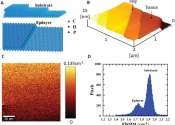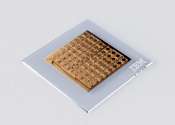EU lawmakers impose single charger for all smartphones
The EU parliament on Tuesday passed a new law requiring USB-C to be the single charger standard for all new smartphones, tablets and cameras from late 2024.
Oct 4, 2022
3
220
Consumer & Gadgets

The EU parliament on Tuesday passed a new law requiring USB-C to be the single charger standard for all new smartphones, tablets and cameras from late 2024.
Oct 4, 2022
3
220
Engineering

Engineers at Tufts University have created a first-of-its-kind flexible electronic sensing patch that can be sewn into clothing to analyze your sweat for multiple markers. The patch could be used to to diagnose and monitor ...
Jul 28, 2020
0
125
Internet

Tim Hart was sitting on his couch one evening in November 2011 when he got an email with the subject line: "I'm watching." The message that followed was short and to the point …
Feb 26, 2021
0
10
Electronics & Semiconductors

A National Institute for Materials Science (NIMS) research team has developed the world's first n-channel diamond MOSFET (metal-oxide-semiconductor field-effect transistor). The developed n-channel diamond MOSFET provides ...
Mar 15, 2024
0
103
Electronics & Semiconductors

Researchers at the Department of Instrumentation and Applied Physics (IAP), Indian Institute of Science (IISc), have designed a novel ultramicro supercapacitor, a tiny device capable of storing an enormous amount of electric ...
Mar 31, 2023
0
3170
Electronics & Semiconductors

For decades, electronics engineers have been trying to develop increasingly advanced devices that can perform complex computations faster and consuming less energy. This has become even more salient after the advent of artificial ...
Engineering

Researchers at the University of Colorado Boulder have developed a new, low-cost wearable device that transforms the human body into a biological battery.
Feb 10, 2021
3
1499
Engineering

A new kind of solar panel, developed at the University of Michigan, has achieved 9% efficiency in converting water into hydrogen and oxygen—mimicking a crucial step in natural photosynthesis. Outdoors, it represents a major ...
Jan 4, 2023
2
326
Engineering

The 3D printing company Desktop Metal has just announced the release of Forust, a new tool using wood to 3D print objects. The company, founded in 2019, focuses on 3D printing for interior design. With printing methods deemed ...
Electronics & Semiconductors

In recent decades, machine learning and deep learning algorithms have become increasingly advanced, so much so that they are now being introduced in a variety of real-world settings. In recent years, some computer scientists ...
Electronics is a branch of science and technology that deals with the flow of electrons through nonmetallic conductors, mainly semiconductors such as silicon. It is distinct from electrical science and technology, which deal with the flow of electrons and other charge carriers through metal conductors such as copper. This distinction started around 1906 with the invention by Lee De Forest of the triode. Until 1950 this field was called "radio technology" because its principal application was the design and theory of radio transmitters, receivers and vacuum tubes.
The study of semiconductor devices and related technology is considered a branch of physics, whereas the design and construction of electronic circuits to solve practical problems come under electronics engineering. This article focuses on engineering aspects of electronics.
This text uses material from Wikipedia, licensed under CC BY-SA